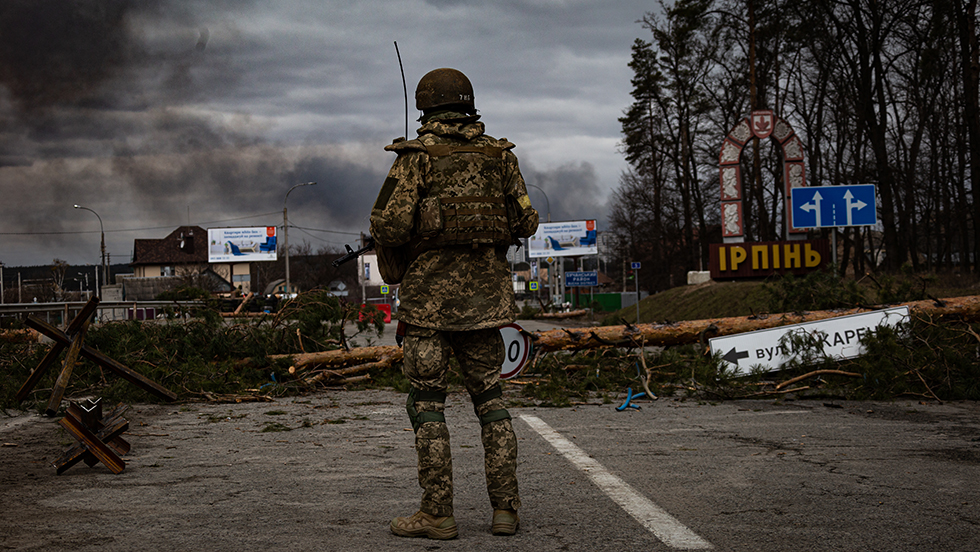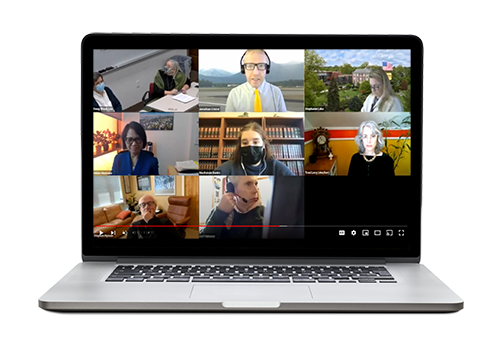
Four days after Russia invaded Ukraine, Adelphi faculty hosted a teach-in to help students make sense of the conflict.
When Russia invaded Ukraine on February 24, 2022, unfolding events left the Ukrainian people fighting for their own survival— and the rest of us struggling to understand how the world had changed. From the capitals of Europe to the halls of Adelphi University, we all wondered: Why had Russia done such a thing? What would the war mean for global stability? Would other countries get dragged into the conflict?

The teach-in was held on campus and was live-streamed on Zoom. Dr. Laatikainen is seen top left, wearing a scarf. Dr. Cristol is in the panel in the middle of the top row, while Dr. Christofferson is in the middle of the bottom row.
Katie Laatikainen, PhD, professor of political science and director of the Levermore Global Scholars program, decided it was time to host a teach-in—an Adelphi tradition. “Professors quickly organize a public discussion to help students come to grips with an issue grabbing public attention, such as the attacks on September 11th or the murder of George Floyd,” she said.
Other Adelphi professors joined Dr. Laatikainen’s event, held on February 28, to provide full context for the invasion. Jonathan Cristol, PhD, adjunct faculty in the international studies department, discussed how it might upset the current geopolitical balance, while Michael Christofferson, PhD, professor of history, spoke about the history of Russia-Ukraine relations. “The Russian foreign policy establishment has felt, since the end of the Cold War, that NATO has expanded into Eastern Europe without concern for Russian security,” he said. “It is also the profound belief of this foreign policy elite that Ukraine is fundamentally a part of Russia and should at least retain close ties to it.”
Dr. Laatikainen drew on her expertise in the structure of international institutions—specifically, the United Nations and the European Union—to examine the war’s international legal implications. “The UN Charter offers three justifications for force,” she told attendees. “Self-defense, fulfillment of collective security obligations, and if the action is authorized by the UN Security Council.” None of these conditions were met, “so Russia’s invasion was an egregious violation of the UN Charter and therefore of international law.”
The response from the student body was overwhelmingly positive. “The teach-in sparked a lot of conversation in Spring 2022, which was important because students had come with this urgent need to learn,” Dr. Laatikainen said. Dr. Christofferson concurred, stressing the value of finding ways to communicate with such a diverse student body. “Some who attended the teach-in knew next to nothing about the conflict or the parties to it,” he said. “Others were already well informed and had personal connections as immigrants or as the children of immigrants from the region. Both groups got something out of attending.”
More than a year later, Dr. Laatikainen is looking back on the teach-in with new insight. While she initially believed that the UN had failed in effectively responding to the war, she says its response over the past several months has been redemptive. “Though it’s very rare for a state to be ejected—given the UN’s Charter and structural constraints—the General Assembly has managed to oust Russia from the Human Rights Council. Additionally, the General Assembly has become much more active than it once had been on security issues.” While these censures from the General Assembly don’t carry any obligatory actions, they do help stymie Russia’s efforts to legitimize its war of aggression.
Now, according to Dr. Laatikainen, the stakes of the war are higher than ever. “It’s a fulcrum upon which the whole edifice of international law and organization balances,” she said. “The big question is this: Is the liberal international order just a legacy of the West, or is it going to be universal? The United States will not be able to dominate the outcome of the war, so it will need to work hard to get the resolution of this conflict right. That will set the stage for how conflict is managed worldwide over the next century.”